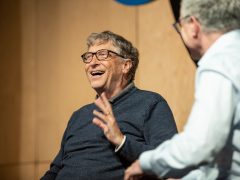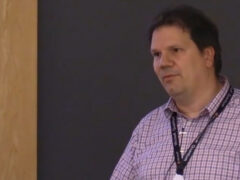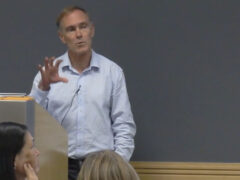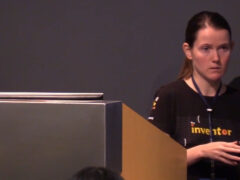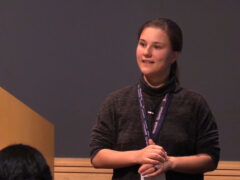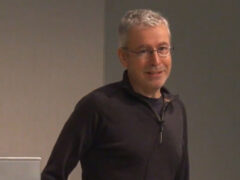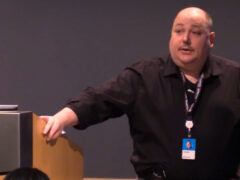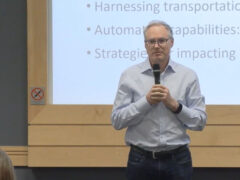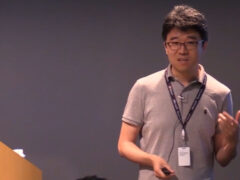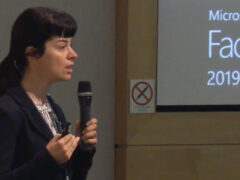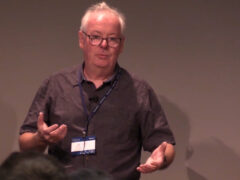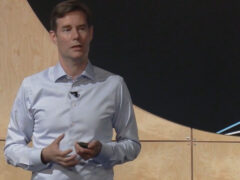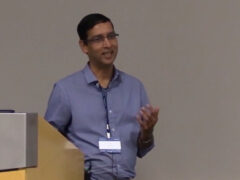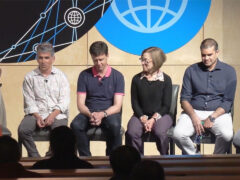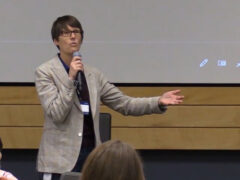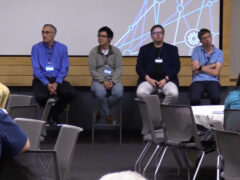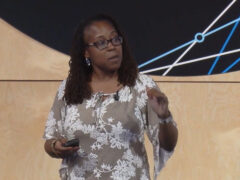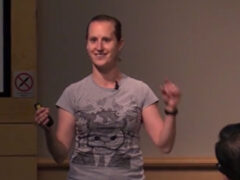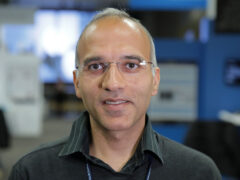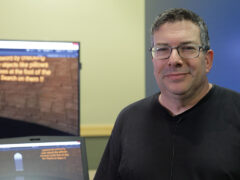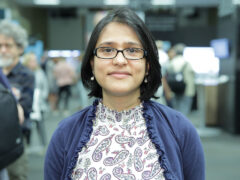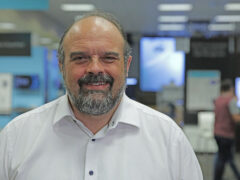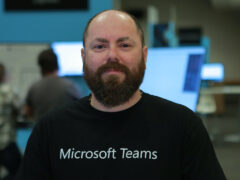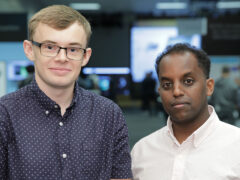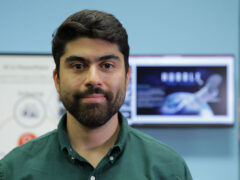Vision to Language
- Julia Hockenmaier, Larry Zitnick, Margaret Mitchell, and Richard Zemel | Microsoft Research, Universty of Illinois-Urbana Champaign, University of Toronto
The recent advances in computer vision, natural language processing and other related areas has led to a renewed interest in artificial intelligence applications spanning multiple domains. Specifically, the generation of natural human-like captions for images has seen an extraordinary increase in interest. In this session, the speakers provide insight into this area. They describe several techniques that combine state-of-the-art computer vision techniques and language models to produce descriptions of visual content with surprisingly high quality. The limitations of current approaches and the challenges that lie ahead are both emphasized.
Speaker Details
C. Lawrence Zitnick is a principal researcher in the Interactive Visual Media group at Microsoft Research, and is an affiliate associate professor at the University of Washington. He is interested in a broad range of topics related to visual object recognition, language and artificial intelligence. He developed the PhotoDNA technology used by Microsoft, Facebook, Google, and various law enforcement agencies to combat illegal imagery on the web. Before joining Microsoft Research, he received the PhD degree in robotics from Carnegie Mellon University in 2003.
Julia Hockenmaier is associate professor in Computer Science at the University of Illinois at Urbana-Champaign. She works on natural language processing. Her current research focuses on automatic image description, statistical parsing, and unsupervised grammar induction. Julia received her PhD from the University of Edinburgh and did postdoctoral work at the University of Pennsylvania. She has received an NSF CAREER award was shortlisted for the British Computer Society’s Distinguished Dissertation award.
“Margaret Mitchell is a researcher in Microsoft’s NLP Research Group, working on grounded language generation. Before joining Microsoft, she was a postdoctoral researcher at The Johns Hopkins University Center of Excellence, where she worked on semantic role labeling and sentiment analysis using graphical models. ”
Richard Zemel is a Professor of Computer Science at the University of Toronto, where he has been a faculty member since 2000. Prior to that, he was an Assistant Professor of Computer Science and Psychology at the University of Arizona, and was a Postdoctoral Fellow at the Salk Institute and at Carnegie Mellon University. He received the B.Sc. degree in History & Science from Harvard University in 1984, and a Ph.D. in Computer Science from the University of Toronto in 1993. He has received several awards and honors, including a Young Investigator Award from the Office of Naval Research, and six Dean’s Excellence Awards at the University of Toronto. He is a Fellow of the Canadian Institute for Advanced Research, and a member of the NIPS Advisory Board. His research interests include topics in machine learning, vision, and neural coding. His recent research focuses on structured output models, image-text analysis, and fairness.
-
-
Jeff Running
-
Larry Zitnick
Principal Researcher
-
Margaret Mitchell
Researcher
-
-
Series: Microsoft Research Faculty Summit
-
-
-
Cars, Computing and the Future of Work: Specific topics of mutual interest
- Linda Boyle,
- Ed Doran,
- John Lee
-
-
-
Crowd, Cloud and the Future of Work: Updates from human AI computation
- Pietro Michelucci,
- Lucy Fortson,
- Franco Pestilli
-
-
Cars, Computing and the Future of Work: A UW & MSR Workshop: Welcome and Overview of Projects
- Linda Boyle,
- Ed Doran,
- Eric Horvitz
-
-
Crowd, Cloud and the Future of Work: Welcome and Updates
- Besmira Nushi,
- Ece Kamar,
- Kori Inkpen
-
Empowering People to Achieve More: How Useful a Concept is Productivity?
- Brendan Murphy,
- Yvonne Rogers,
- Steve Whittaker
-
Keynote - The Future of Work And the Power of Data
- Johannes Gehrke
-
Productivity in Software Development
- Neel Sundaresan,
- Margaret-Anne Storey,
- Prem Kumar Devanbu
-
Artificial Emotional Intelligence, Social Systems, and the Future of Collaboration
- Mary Czerwinski,
- Mark Ackerman,
- Gloria Mark
-
Workers of the World, Connect! Tech Innovations and Organizational Change for the Future of Work(ers)
- Mary Gray,
- Jamie Woodcock,
- Louise Hickman
-
Increasing AI Programmer Productivity
- Markus Weimer,
- Sarah Bird,
- Ce Zhang
-
Human-AI Collaboration for Decision-Making
- Besmira Nushi,
- Ayanna Howard,
- Jon Kleinberg
-
Future of Spreadsheeting
- Ben Zorn,
- Felienne Hermans,
- Daniel Barowy
-
Program Synthesis meets Notebooks
- Sumit Gulwani
-
Accessible Virtual Reality
- Eyal Ofek
-
Calendar.help: A Virtual Meeting Scheduling Assistant
- Pamela Bhattacharya
-
Visual Studio IntelliCode
- Mark Wilson-Thomas
-
Microsoft Teams: Collaborate with Any Researcher Anywhere
- Jethro Seghers
-
Project Alava: Programming Webs of Microcontrollers
- James Devine,
- Teddy Seyed
-
AI in PowerPoint
- Kostas Seleskerov

